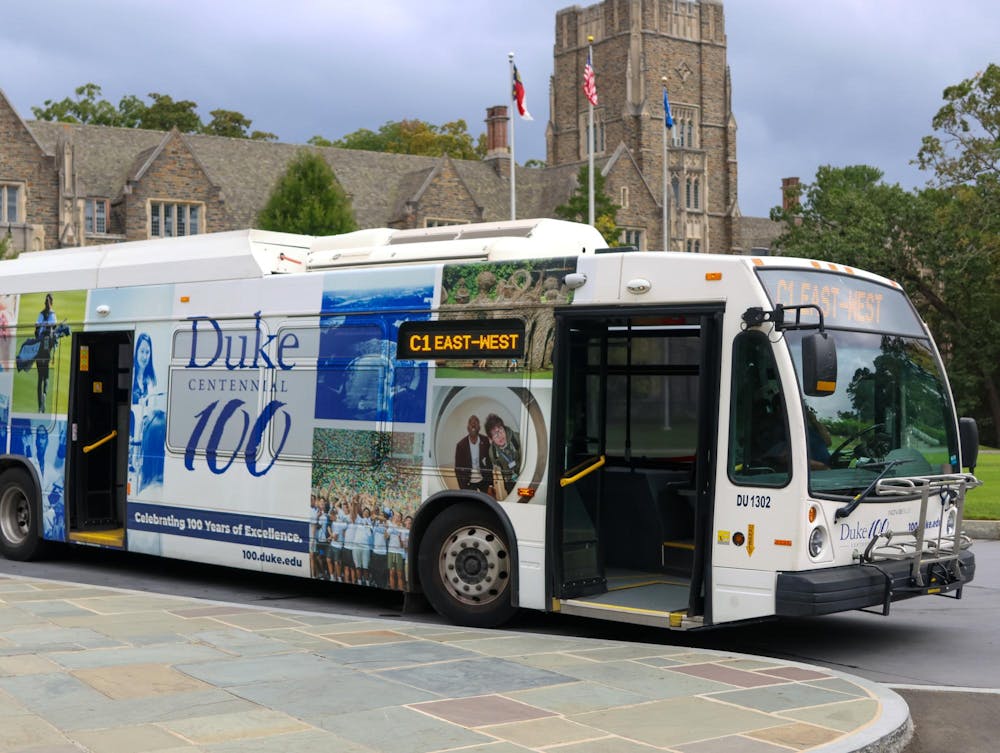Spanning three campuses and over 8,000 acres, Duke may seem difficult to navigate. The Chronicle has broken down the University’s transportation options for getting around campus this academic year.
Duke buses
Duke Parking and Transportation operates a free bus service on campus for anyone to use. Riders can see routes and track buses currently in operation on the TransLoc app.
There are currently seven operational bus routes, five of which are classified as campus routes: C1: East-West, SWS: Swift Avenue Shuttle, LNC: Lancaster Commons, LL: LaSalle Loop and PR1: Bassett-Research.
Perhaps the most well-known route among Duke’s undergraduate population, the C1 services travel between East and West Campus via Campus Drive. Buses run in 10-minute intervals from 6:30 a.m. to 12:27 a.m. on weekdays and from 7 a.m. to 12:27 a.m. on weekends.
The Swift route is commonly used by juniors and seniors living at 300 and 301 Swift and the recently acquired Blue Light Living apartment complex, connecting the residential buildings to West Campus. Buses are scheduled to run in 10-minute intervals from 7 a.m. to 12:16 a.m. every day. On the weekend, an alternative C-Swift route operates, beginning on East Campus.
The LNC connects the Lancaster Commons apartments for graduate students on Western Boulevard to the Science Drive loop. Buses operate from 7:30 a.m. to 10:02 p.m. on weekdays and from 7:30 a.m. to 6:42 p.m. on weekends.
The LL and PR1 routes run only on weekdays. The LL services much of the Duke University Medical Center, running a morning route from 7 a.m. to 5:22 p.m. and an expanded evening route from 5:30 p.m. to 9:58 p.m.
The PR1 route begins at the Grounds lot behind Wallace Wade Stadium and ends at Duke Medicine Circle, connecting Duke’s athletic facilities with the Science Drive Circle and Duke Hospital. Buses run from 6:36 a.m. to 8:28 p.m. but do not operate past 7 p.m. on weeknights when Duke football plays home games.
Parking and Transportation also operates the H1: Remote Health System Lots and H2: Hospital Loop routes, which serve the Duke University Health System on weekdays.
Bikes, scooters and mopeds
Duke allows the use of both regular and electric bikes on campus. Parking and Transportation recently allowed e-scooter and e-bike rental company Spin to expand its presence on campus.
Riders are encouraged to register their bikes with Parking and Transportation, which the office says discourages theft and offers discounts at select local businesses through national incentive program Bicycle Benefits.
When not in use, students are required to store their bikes “locked to or near the vicinity of” racks, which are located around campus. All bike racks on campus except those located outside of residence halls are intended for short-term storage, and bikes left outdoors “for an extended period of time” are subject to confiscation.
There are five bike self-repair stations on campus with equipment for servicing bikes and filling up tires — one on East Campus, one at the Duke University Medical Center and the remaining three on West Campus.
Some students opt for mopeds and motorcycles, which must be registered with Parking and Transportation Services as licensed vehicles. Mopeds can be parked at certain designated areas on campus.
Bikes, scooters and mopeds cannot be used in dismount zones — areas with congested foot traffic — which include Abele Quad, the Bryan Center Plaza and the Sarah P. Duke Gardens.
Cars
All students are allowed to bring cars to campus, with parking permits for the 2024-25 academic year available for $474.
Parking lot access varies by class year. First-year students are allowed to park at Smith Warehouse, West Campus residents can park in the Blue Zone and Swift residents can park in the Swift garage and parking lot. Blue Light residents are eligible to purchase “BLL” permits and should contact building management at info@bluelightliving.com for 2024-25 parking information.
Get The Chronicle straight to your inbox
Sign up for our weekly newsletter. Cancel at any time.
Off-campus services
Duke Vans is an on-demand van service that operates outside of bus hours to transport passengers to Duke facilities and locations within a 1.5-mile radius of campus. Users can call a Duke van using the Transloc app from 6:30 p.m. to 2:45 a.m. Monday through Saturday.
Duke community members are able to access GoTriangle and GoRaleigh buses free of charge through the GoPass program. The service was recently reinstated following a temporary pause this summer when GoTriangle ended its COVID-era fare-free ridership program.
GoDurham and GoCary buses are fare-free for 2024-25.
The Robertson Express shuttle offers free transportation between Duke and the University of North Carolina at Chapel Hill.
Weekday service begins at 7:30 a.m. on both campuses and ends at 10 p.m. on UNC’s campus and 10:30 p.m. on Duke’s campus, with buses running every 30 minutes. The service recently reduced its weekend schedule and now operates during two three-hour windows on Saturdays and Sundays, starting at 11 a.m. on UNC’s campus and ending at 2 p.m., then later running from 6 p.m. to 9 p.m.

